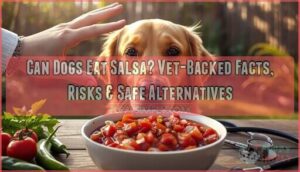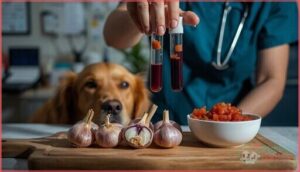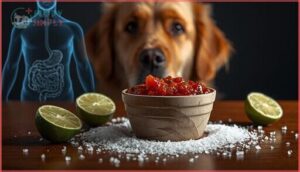This site is supported by our readers. We may earn a commission, at no cost to you, if you purchase through links.
You reach for the salsa bowl at your backyard cookout, and your dog’s eyes lock onto the vibrant red dip. That enthusiastic stare might tempt you to share, but salsa packs a dangerous combination of ingredients that can seriously harm your pet.
Onions and garlic damage red blood cells, while capsaicin from jalapeños burns sensitive canine stomachs. The salt alone can overwhelm your dog’s kidneys. Even a few licks can trigger vomiting, diarrhea, or worse complications that send you rushing to the emergency vet.
Understanding which specific ingredients pose the biggest threats—and recognizing early warning signs—helps you protect your dog from a preventable health crisis.
Table Of Contents
- Key Takeaways
- Can Dogs Eat Salsa?
- Harmful Salsa Ingredients for Dogs
- Health Risks of Salsa for Dogs
- What to Do if Your Dog Eats Salsa
- Safe Alternatives to Salsa for Dogs
- Frequently Asked Questions (FAQs)
- What happens if my dog ate salsa?
- Can dogs eat tomato salsa?
- Is spicy salsa bad for dogs?
- Can dogs eat tomato sauce from a can?
- How does a dogs age affect salsa toxicity levels?
- Can some dog breeds tolerate salsa better than others?
- Are all types of peppers toxic to dogs?
- How much onion is dangerous for dogs?
- Is mild salsa safer than spicy varieties?
- Conclusion
Key Takeaways
- Salsa contains multiple toxic ingredients for dogs—onions and garlic damage red blood cells, causing anemia, while capsaicin from peppers burns their digestive system and high salt levels stress their kidneys.
- Even small amounts of salsa can trigger serious health problems within 24-72 hours, including vomiting, diarrhea, weakness, pale gums, and dark urine that may require emergency veterinary care.
- You should contact your vet immediately if your dog eats salsa, especially if symptoms persist beyond 12 hours or you notice signs of anemia like weakness and pale gums.
- Safe alternatives include plain vegetables like carrots, green beans, and cucumbers, or homemade treats with dog-safe ingredients like sweet potato, plain peanut butter, and fresh fruit.
Can Dogs Eat Salsa?
No, you shouldn’t feed salsa to your dog. While salsa nutrition works for humans, it fails every test for dog food safety.
Like tortillas and other human snacks, salsa contains ingredients that seem innocent but can cause digestive upset or worse in dogs.
This popular condiment contains multiple toxic foods for dogs, including onions and garlic that damage red blood cells. The spicy peppers, high salt content, and acidic tomatoes create a perfect storm for canine nutrition problems.
Understanding food safety for pets means recognizing that salsa alternatives exist. Eating salsa can lead to gastrointestinal problems in dogs, including vomiting and diarrhea.
Smart canine diet planning and pet owner guidance start with keeping this spicy dip off your dog’s plate entirely.
Harmful Salsa Ingredients for Dogs
Salsa packs a punch with ingredients that might seem harmless to you but can spell trouble for your dog. What makes this tangy condiment unsafe isn’t just one component—it’s a combination of several common additions that don’t sit well with canine digestive systems.
Let’s break down the main culprits you need to watch out for.
Onion and Garlic Toxicity
Onions and garlic contain disulfides and thiosulfanates, toxic compounds that cause oxidative damage to your dog’s red blood cells. Even small amounts can trigger hemolytic anemia, where cells rupture and Heinz bodies form.
Onions and garlic contain toxic compounds that destroy your dog’s red blood cells, even in small amounts
You’ll find these toxins in raw, cooked, or powdered forms, making salsa particularly dangerous. Garlic poisoning and onion toxicity can develop within 24 to 72 hours, creating serious animal health risks requiring immediate veterinary attention.
For more on symptoms and response steps, see this resource about onion and garlic poisoning in dogs.
Risks of Spicy Peppers
Chilies like jalapeño pack capsaicin, which irritates your dog’s mouth, esophagus, and stomach lining. You’ll notice drooling, pawing at the face, or gastrointestinal upset after exposure.
Unlike humans who build long-term tolerance, dogs lack this adaptation, making even mild peppers a pet safety concern. Food toxicity from spicy peppers can trigger vomiting, diarrhea, and abdominal pain, compounding the risks already present from toxic onions and garlic.
High Salt and Acidic Content
Beyond the toxic onions and garlic, salsa delivers a double punch of high sodium and acidity from tomatoes and lime. A single serving can hit 300 milligrams of salt, stressing your dog’s kidneys and electrolyte balance.
The acidity can also irritate their stomach lining, and cream-based options like Alfredo sauce pose even greater risks with dangerous sodium levels.
Acidic ingredients irritate the stomach lining, triggering symptoms like:
- Excessive drooling and lip-smacking
- Vomiting or acid reflux episodes
- Increased thirst from sodium intake
- Diarrhea affecting digestive health
This combination amplifies stomach irritation substantially.
Other Common Salsa Additives
Spice blending often introduces cumin and paprika, which irritate your dog’s stomach. Cilantro and citrus variations like lemon juice add flavor but worsen acidity.
Texture modifiers such as corn or avocado chunks aren’t toxic yet complicate digestion. Herb combinations and flavor enhancers may contain preservatives that cause additional upset.
Even seemingly harmless ingredients exacerbate the risks already present from onions, garlic, chilies, and lime.
Health Risks of Salsa for Dogs
Salsa doesn’t just cause a little tummy trouble—it can trigger serious health problems in dogs.
The symptoms can range from mild discomfort to life-threatening conditions that require immediate veterinary care.
Here’s what you need to watch for if your dog gets into salsa.
Gastrointestinal Upset Symptoms
When salsa hits your dog’s stomach, you’ll likely see the fallout within hours. The acidic and spicy ingredients trigger gastrointestinal distress that manifests in several unmistakable ways.
- Vomiting usually starts one to six hours after ingestion as your dog’s body tries to expel the toxic irritants
- Diarrhea often appears within 24 hours, with loose or watery stools occurring three or more times
- Abdominal discomfort shows through restlessness, bloating, or your dog hunching their back in pain
Signs of Toxicity and Anemia
The real danger lurks beneath those surface symptoms. When onions or garlic from salsa destroy your dog’s red blood cells, you’ll notice pale gums, weakness, and rapid breathing within one to three days. Dark urine signals canine hemolysis progressing. If vomiting or diarrhea persists beyond 12 hours, or you spot these anemia symptoms, veterinary guidance isn’t optional—it’s essential.
| Toxicity Signs | Timeline | Action Needed |
|---|---|---|
| Pale gums, lethargy | 1-3 days | Contact vet immediately |
| Dark or red urine | 24-72 hours | Emergency veterinary care |
| Persistent vomiting | 12+ hours | Seek veterinary guidance |
Severe Reactions to Salsa Ingredients
When toxic compound effects from salsa escalate, your dog faces genuine emergencies. Severe canine sensitivity to ingredient interactions can trigger life-threatening complications requiring immediate veterinary advice.
- Sodium ion poisoning from excessive salt causes seizures, tremors, or coma
- Pancreatitis develops from fat-laden salsa variations with dairy additions
- Severe anemia from onions and garlic demands blood transfusions in critical cases
- Anaphylactic shock strikes dogs with salsa allergens like sulfites or cross-contaminants
- Aspiration pneumonia occurs when vomiting leads to inhaled stomach contents
Emergency response means acting fast when symptoms worsen.
What to Do if Your Dog Eats Salsa
If your dog gets into salsa, don’t panic—but do pay close attention to how they’re acting over the next several hours.
The amount they ate and the specific ingredients matter, so knowing what to watch for can help you decide if a vet visit is necessary.
Here’s what you need to do right away and when it’s time to get professional help.
Monitoring for Symptoms
After your dog gets into salsa, keep close watch for the next 24 hours. You’ll want to track symptoms of salsa ingestion in dogs like vomiting, diarrhea, or drooling. Health monitoring means noting when symptoms start and how they progress. Dog behavior changes matter too—watch for weakness, excessive thirst, or loss of appetite. Symptom tracking helps you spot trouble early and gives your vet vital information about reaction times if you need veterinary guidance.
| Symptom Category | What to Watch For |
|---|---|
| Digestive Issues | Vomiting, diarrhea, drooling, or upset stomach within 2-12 hours |
| Toxic Ingredients Effects | Weakness, pale gums, rapid breathing (signs of anemia from onions/garlic) |
| Mouth/Throat Irritation | Excessive lip-licking, pawing at mouth, gagging from spicy peppers |
| Dehydration Signs | Increased thirst, dry gums, reduced urination, skin tenting |
| Behavioral Changes | Restlessness, hiding, whining, loss of appetite, lethargy |
When to Contact a Veterinarian
Knowing when to pick up the phone can make all the difference. Call your veterinarian immediately if vomiting persists beyond 12 hours, you notice weakness or pale gums indicating potential anemia, or your dog shows labored breathing after toxic exposure.
Emergency care becomes urgent with any suspected onion or garlic ingestion—even without symptoms yet. Vet visit prep and urgent consultations prevent complications from toxic ingredients. When symptom monitoring reveals concerning signs, don’t wait.
Immediate Home Care Steps
Once you’ve called your vet, focus on canine first aid at home. Rinse your dog’s mouth gently with water to remove salsa residue—this emergency response helps reduce irritation.
Don’t induce vomiting without vet guidance. Offer small sips of water to soothe an upset stomach. Pet monitoring matters: watch for drooling, restlessness, or worsening symptoms while following your vet’s home remedies advice for canine wellness.
Safe Alternatives to Salsa for Dogs
You don’t need to give up sharing snacks with your dog just because salsa is off the table. There are plenty of safe alternatives that let you include your pup in snack time without the worry.
Here are some vet-approved options that won’t put your dog’s health at risk.
Dog-Friendly Vegetable Snacks
Crunchy carrots offer beta carotene for eye health and natural fiber that aids digestion—they’re genuinely low-calorie veggie delights your dog will enjoy. Green beans deliver vitamins A, C, and K while promoting canine wellness without extra calories.
You can also serve cucumber slices for hydration or small broccoli florets for immune support. These healthy snacks meet pet nutrition needs without the risks that come with human food like salsa.
Healthy Homemade Treat Options
You can whip up homemade treats that beat salsa every time for dog health and nutrition. Try these safe alternatives to human food for dogs:
- Fresh fruit like strawberries or watermelon offers natural sweetness without added sugar
- Nutritious bites made from plain peanut butter mixed with oats create chewy snacks
- Veggie delights using sweet potato pieces provide complex carbs
- Frozen treats with plain yogurt and mashed banana cool your pup down
These grain-free options support canine nutrition without toxic ingredients.
Tips for Preventing Accidental Ingestion
Beyond making treats, you need strong accident prevention strategies to protect pet health. Focus on safe storage by keeping salsa containers far from curious noses, and practice thorough kitchen cleanup after meals. Pet proofing your space means storing toxic onion and garlic products out of reach. During supervised meals, block access to countertops where dogs might grab salsa.
| Prevention Strategy | Action Steps |
|---|---|
| Safe Storage | Lock cabinets with onion and garlic; refrigerate salsa on high shelves |
| Kitchen Cleanup | Wipe counters immediately; rinse bowls to remove lingering smells |
| Supervised Meals | Use pet gates; keep dogs away from dining areas during parties |
These dog safety measures reduce risks noticeably.
Frequently Asked Questions (FAQs)
What happens if my dog ate salsa?
If your dog ate salsa, watch for vomiting, diarrhea, or lethargy within 24 hours.
Onion and garlic toxicity can develop gradually, so contact your veterinarian immediately if symptoms appear or the amount was significant.
Can dogs eat tomato salsa?
Even though ripe tomatoes alone won’t usually harm your dog, tomato salsa still poses serious Pet Health Risks due to toxic Salsa Ingredients like onions, garlic, and spicy peppers that threaten Canine Nutrition and require Veterinary Care and Advice.
Is spicy salsa bad for dogs?
Yes, spicy salsa poses serious health risks for dogs.
Capsaicin from chili peppers burns your dog’s mouth, causes excessive drooling, and triggers abdominal pain.
While toxic components in salsa create dangerous gastrointestinal distress.
Can dogs eat tomato sauce from a can?
Canned tomato sauce usually contains onions and garlic, both toxic to dogs even in small amounts.
High salt levels can cause dehydration, while added sugar and spices may upset your dog’s stomach.
How does a dogs age affect salsa toxicity levels?
Your dog’s age dramatically shifts salsa toxicity levels.
Puppies face heightened sensitivity due to immature liver function, while senior dogs experience amplified risks from age-related kidney changes and cumulative exposure to toxic onion compounds.
Can some dog breeds tolerate salsa better than others?
All breeds face the same salsa toxicity risks from onions, garlic, and capsaicin.
While some dogs show gastrointestinal upset faster due to individual dietary sensitivities, breed-specific tolerance doesn’t exist for these harmful ingredients.
Are all types of peppers toxic to dogs?
Not all peppers pose toxicity risks. Bell peppers contain no capsaicin and provide safe nutrition.
While jalapeños and chilies carry harmful capsaicin effects that trigger spice intolerance and digestive distress in dogs.
How much onion is dangerous for dogs?
Even small amounts of onion toxicity can harm your dog—as little as 5% of their body weight poses risk.
For a twenty-pound dog, that’s just a few ounces, making onion toxicity levels surprisingly low.
Is mild salsa safer than spicy varieties?
Turning down the heat doesn’t dial back the danger. Mild Salsa Risks remain high because both mild and Spicy Food Reactions stem from toxic components in salsa for pets like onions and garlic, not just capsaicin from Salsa Heat Levels or spicy salsa.
Conclusion
Better safe than sorry rings especially true when your dog’s health hangs in the balance. The answer to “can dogs eat salsa” is a definitive no—the onions, garlic, and peppers pose real dangers that far outweigh any fleeting enjoyment.
Stick with vet-approved vegetables and dog-specific treats instead. Your vigilance at mealtime protects your companion from painful stomach issues, toxic reactions, and emergency vet visits that nobody wants to face.
- https://www.petpoisonhelpline.com/poison/onion/
- https://www.merckvetmanual.com/toxicology/food-hazards/allium-spp-toxicosis-in-animals
- https://www.pdsa.org.uk/pet-help-and-advice/pet-health-hub/conditions/onion-and-garlic-poisoning-in-dogs?_$ja=tsid:|cid:1403862223|agid:61029692051|tid:dsa-582247928352|crid:269404588760|nw:g|rnd:4035879279560763457|dvc:c|adp:|mt:|loc:9046990&gclid=CjwKCAiAh9qdBhAOEiwAvxIok3wZ7KJKCyETBDx1Ptt_s6WVnqWeR4fcoZBfBEDiZ9wWCUGS7wWB0RoChdoQAvD_BwE
- https://www.petmd.com/
- https://www.aspca.org/














